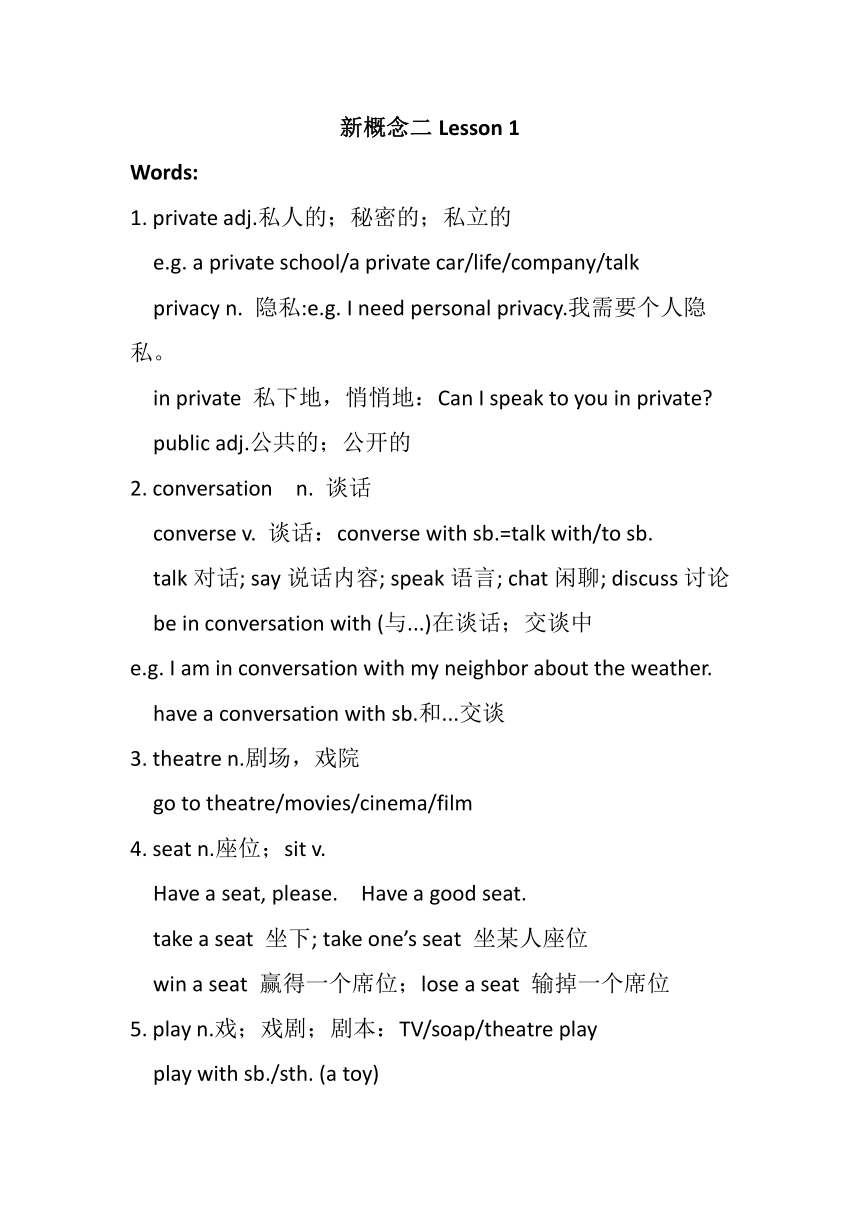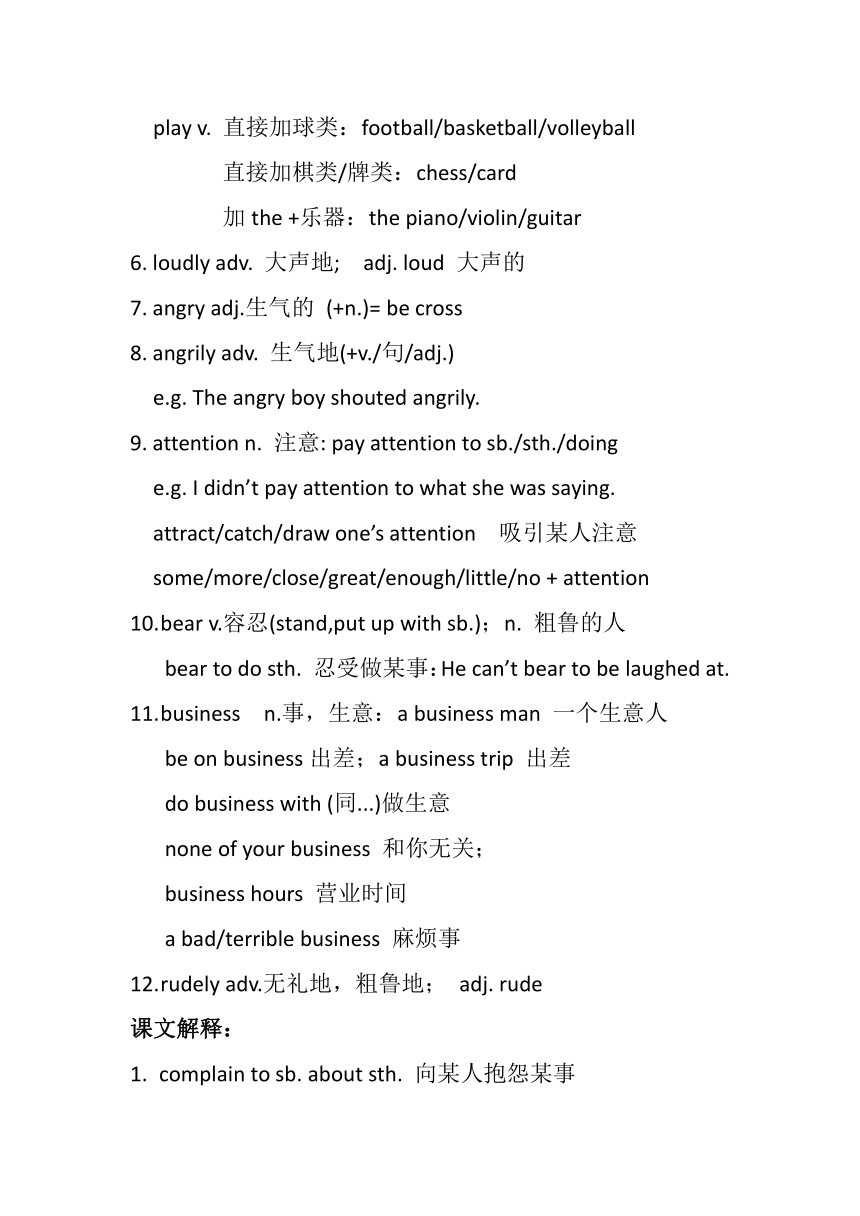新概念英语第二册Lesson 1 A private conversation单词讲解
文档属性
| 名称 | 新概念英语第二册Lesson 1 A private conversation单词讲解 |

|
|
| 格式 | docx | ||
| 文件大小 | 18.3KB | ||
| 资源类型 | 教案 | ||
| 版本资源 | 新概念英语 | ||
| 科目 | 英语 | ||
| 更新时间 | 2024-04-15 00:00:00 | ||
图片预览


文档简介
新概念二Lesson 1
Words:
private adj.私人的;秘密的;私立的
e.g. a private school/a private car/life/company/talk
privacy n. 隐私:e.g. I need personal privacy.我需要个人隐私。
in private 私下地,悄悄地:Can I speak to you in private
public adj.公共的;公开的
conversation n. 谈话
converse v. 谈话:converse with sb.=talk with/to sb.
talk对话; say说话内容; speak语言; chat闲聊; discuss讨论
be in conversation with (与...)在谈话;交谈中
e.g. I am in conversation with my neighbor about the weather.
have a conversation with sb.和...交谈
theatre n.剧场,戏院
go to theatre/movies/cinema/film
seat n.座位;sit v.
Have a seat, please. Have a good seat.
take a seat 坐下; take one’s seat 坐某人座位
win a seat 赢得一个席位;lose a seat 输掉一个席位
play n.戏;戏剧;剧本:TV/soap/theatre play
play with sb./sth. (a toy)
play v. 直接加球类:football/basketball/volleyball
直接加棋类/牌类:chess/card
加the +乐器:the piano/violin/guitar
loudly adv. 大声地; adj. loud 大声的
angry adj.生气的 (+n.)= be cross
angrily adv. 生气地(+v./句/adj.)
e.g. The angry boy shouted angrily.
attention n. 注意: pay attention to sb./sth./doing
e.g. I didn’t pay attention to what she was saying.
attract/catch/draw one’s attention 吸引某人注意
some/more/close/great/enough/little/no + attention
bear v.容忍(stand,put up with sb.);n. 粗鲁的人
bear to do sth. 忍受做某事:He can’t bear to be laughed at.
business n.事,生意:a business man 一个生意人
be on business出差;a business trip 出差
do business with (同...)做生意
none of your business 和你无关;
business hours 营业时间
a bad/terrible business 麻烦事
rudely adv.无礼地,粗鲁地; adj. rude
课文解释:
complain to sb. about sth. 向某人抱怨某事
Last week, I went to the theatre.
(时间状语) 主 谓 宾语(对象)
The play was very interesting.
主 系 表
I got (变得) very angry.
主 系 表
系动词: 1. be动词(单独出现)
(+adj.) 2.get/become/turn/go/grow “变得”
3. Look/sound/smell/taste/feel
看/听/闻/尝/感觉起来
简单陈述句的分类:(五大类)
主谓: They meet. (vi.不及物动词)
主谓宾: I like you. (vt.及物动词)
主谓宾宾: I tell you a secret.
主谓宾宾补: I find you interesting.
主系表: You are nice.
是否为及物动词,根据意思可判断:e.g. swim(vi.); beat(vt.)
简单陈述句的构成核心: 主语(n.) +谓语(v.)
Birds fly. (vi.) We talk. (vi.) Boys talk. (vi.)
变化: Boys were talking.
Lovely boys were talking loudly.
Yesterday after class lovely boys were talking loudly
about the exam in the classroom.
谓语动词的变化:时态、语态、情态、否定
They were talking loudly. It was bought by Alice.
I could not hear the actors. I did not enjoy it.
状语:怎 (怎么样) 地(地点) 时(时间)
Words:
private adj.私人的;秘密的;私立的
e.g. a private school/a private car/life/company/talk
privacy n. 隐私:e.g. I need personal privacy.我需要个人隐私。
in private 私下地,悄悄地:Can I speak to you in private
public adj.公共的;公开的
conversation n. 谈话
converse v. 谈话:converse with sb.=talk with/to sb.
talk对话; say说话内容; speak语言; chat闲聊; discuss讨论
be in conversation with (与...)在谈话;交谈中
e.g. I am in conversation with my neighbor about the weather.
have a conversation with sb.和...交谈
theatre n.剧场,戏院
go to theatre/movies/cinema/film
seat n.座位;sit v.
Have a seat, please. Have a good seat.
take a seat 坐下; take one’s seat 坐某人座位
win a seat 赢得一个席位;lose a seat 输掉一个席位
play n.戏;戏剧;剧本:TV/soap/theatre play
play with sb./sth. (a toy)
play v. 直接加球类:football/basketball/volleyball
直接加棋类/牌类:chess/card
加the +乐器:the piano/violin/guitar
loudly adv. 大声地; adj. loud 大声的
angry adj.生气的 (+n.)= be cross
angrily adv. 生气地(+v./句/adj.)
e.g. The angry boy shouted angrily.
attention n. 注意: pay attention to sb./sth./doing
e.g. I didn’t pay attention to what she was saying.
attract/catch/draw one’s attention 吸引某人注意
some/more/close/great/enough/little/no + attention
bear v.容忍(stand,put up with sb.);n. 粗鲁的人
bear to do sth. 忍受做某事:He can’t bear to be laughed at.
business n.事,生意:a business man 一个生意人
be on business出差;a business trip 出差
do business with (同...)做生意
none of your business 和你无关;
business hours 营业时间
a bad/terrible business 麻烦事
rudely adv.无礼地,粗鲁地; adj. rude
课文解释:
complain to sb. about sth. 向某人抱怨某事
Last week, I went to the theatre.
(时间状语) 主 谓 宾语(对象)
The play was very interesting.
主 系 表
I got (变得) very angry.
主 系 表
系动词: 1. be动词(单独出现)
(+adj.) 2.get/become/turn/go/grow “变得”
3. Look/sound/smell/taste/feel
看/听/闻/尝/感觉起来
简单陈述句的分类:(五大类)
主谓: They meet. (vi.不及物动词)
主谓宾: I like you. (vt.及物动词)
主谓宾宾: I tell you a secret.
主谓宾宾补: I find you interesting.
主系表: You are nice.
是否为及物动词,根据意思可判断:e.g. swim(vi.); beat(vt.)
简单陈述句的构成核心: 主语(n.) +谓语(v.)
Birds fly. (vi.) We talk. (vi.) Boys talk. (vi.)
变化: Boys were talking.
Lovely boys were talking loudly.
Yesterday after class lovely boys were talking loudly
about the exam in the classroom.
谓语动词的变化:时态、语态、情态、否定
They were talking loudly. It was bought by Alice.
I could not hear the actors. I did not enjoy it.
状语:怎 (怎么样) 地(地点) 时(时间)
同课章节目录
